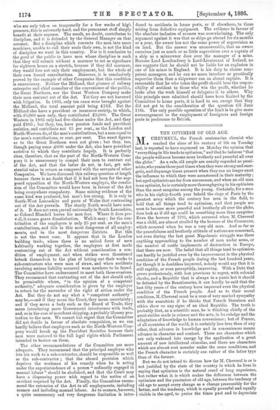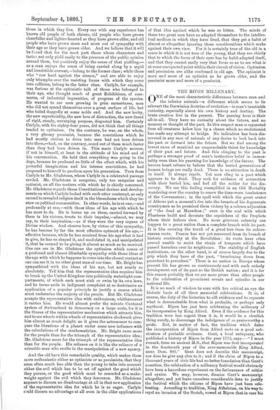THE OPTIMISM OF OLD AGE.
MCHEVREIIL, the French centenarian chemist who • reached the close of his century of life on Tuesday last, is reported to have expressed on Monday the opinion that "everything in life tends to optimism," and that he believes "that the people willeoon become more brotherly and peaceful all over the globe." As a rule, old people are usually regarded as pessi- mists,who praise those past times when they were strong and ener- getic, and disparage times present when they can no longer exert the influence to which they were accustomed in their maturity ; but aged optimists are far from uncommon, and when an old man is an optimist, he is certainly more thoroughgoing in his optimism than the most sanguine among the young. Certainly, for a man who in his eighty-fourth year beheld the siege of Paris by the greatest army which the century has seen in the field, to hold that all things tend to optimism, and that people are soon to become more peaceful and brotherly all over the globe, does look as if old age could be something more than sanguine. Even the horrors of 1793, which occurred when M. Chevreul was a child, are almost rivalled by the horrors of the Commune, which occurred when be was a very old man. And so far as the peacefulness and brotherly attitude of nations are concerned, not even during the last great Napoleonic struggle was there anything approaching to the number of men under arms, or the number of costly implements of destruction in Europe, that there are now. The belief that all things tend to optimism can hardly be justified even by the improvement in the physical condition of the French people during the last hundred years, for though it is doubtless improved, nobody would say that it is still rapidly, or even perceptibly, improving. With a Debt that grows portentously, with lost provinces to regret, with colonial checks, and a Republic that is always in a panic lest it should be defeated by the Reactionaries, it can hardly be said that the last fifty years of the century have improved even the physical condition of the French people. And as to their moral condition, M. Chevreul must be a man of very marked sympathy with the anarchists if he thinks that French literature and. ethics show us any signs of an ideal Republic. The truth is probably that, as a scientific man, he is thinking chiefly of the great strides made in science and the arts, in knawledge and the adaptation of knowledge to human convenience; but of France, of all countries of the world, it is certainly less true than of any other, that advance in knowledge and in conveniences means advance in character and content. There are characters which are only wakened into energy by the application of a great amount of new intellectual stimulus, and there are characters which are almost rent asunder under the same conditions, and the French character is certainly one rather of the latter type than of the former.
But we do not intend to discuss how far M. Chevreul is or is not justified by the state of the country in which he lives in saying that optimism is the natural creed of long experience, but rather what it is which makes the difference between the
optimism and the pessimism of old age, between the tendency of old age to accept every change as a change presumably for the better, and the tendency, which is equally powerful and equally visible in the aged, to praise the times past and to depreciate
those in which they live. Every one with any experience has known old people of both classes, old people who have grown cheerfaller and lighter-hearted as they have grown older, and old people who have grown more and more out of sympathy with their age as they have grown older. And we believe that it will be found that for the most part those whose characters and tastes not only yield easily to the pressure of the public opinion around them, but positively enjoy the sense of that yielding,— as a man enjoys the sense of being carried along by a rapid and irresistible current,—belong to the former class ; while those who "row hard against the stream," and are able to enjoy only triumphs over the resisting forces with which they come into collision, belong to the latter class. Carlyle, for example, was furious at the optimistic talk of those who belonged to their age, who thought much of great Exhibitions, of com- merce, of industrial ingenuities, of progress of the species. He wanted to see men growing in grim earnestness, men who did not spread themselves over a great surface of life, but who toiled doggedly at some noble end. And the new levity, the new superficiality, the new love of distraction, the new dread of rigid, steady, unvarying purpose, disgusted him. Certainly Carlyle, with his eighty-four years, did not think that all things tended to optimism. On the contrary, he was, on the whole, a very gloomy pessimist, because the convictions which he had mostly striven to drive into men had not been driven into them,—had, on the contrary, oozed out of them much faster than they had been driven in. This made Carlyle morose, if not in himself, at least in the attitude of his mind and of his conversation. He held that everything was going to the dogs, because he produced so little of the effect which, with his powerful imagination and his intense convictions, he had proposed to himself to produce. upon his generation. Turn from Carlyle to Mr. Gladstone, whom Carlyle in a celebrated passage reviled. Mr. Gladstone is sanguine, only too sanguine and optimist, on all the matters with which he is chiefly concerned. Mr. Gladstone regards those Constitutional devices and develop- ments on which Carlyle looked with such utter contempt, as only second to revealed religion itself in the blessedness which they be- stow on political communities. In other words, he is at one,—and profoundly at one,—with those ideas of his age with which he has most to do. He is borne up on them, carried forward by them in his visions, trusts to their impulse,—almost, we may say, to their inspiration,—as if they were the very organs of Divine wisdom. And observe how, by virtue of this sympathy, he has become by far the most effective optimist of his age,— effective because, while he has received from his age what it had to give, he has so shaped it, and modulated it, and manipulated it, that he seemed to be giving it almost as much as he received. One can see in Mr. Gladstone the optimism which comes of a profound and almost illimitable sympathy with those ideas of the age with which he happens to come into the closest contact as one can see it in no other great man of our time. Mr. Bright has sympathised with the ideas of his age, but not nearly so absolutely. Tell him that the representative idea requires him to break up the United Kingdom into politically watertight com- partments, of which each must sink or swim by its own laws, and he turns aside in indignant complaint at so doctrinaire an application of a popular principle to justify a course which must undermine the majesty of the people. But Mr. Gladstone accepts the representative idea with enthusiasm, whithersoever it carries him. He would almost prefer the minute Cantonal system of Switzerland to democracy on a large scale, for it is the fitness of the representative mechanism which attracts him, and to see wheels within wheels of representative clockwork gives him almost as much delight as it gives the astronomer to com- pare the librations of a planet under some new influence with the calculations of the mathematician. Mr. Bright cares more for the people than for the triumph of the representative idea; Mr. Gladstone more for the triumph of the representative idea than for the people. His reliance on it is like the reliance of a scientific man who exults in the manipulation of a new agency.
And the old have this remarkable quality, which makes them more enthusiastic either as optimists or as pessimists, that they seem often much less able than the young to take into account either the evil which has to be set off against the good which they pursue, or the good which must be conceded as a make- weight against the evil which they denounce. Mr. Gladstone appears to discern no disadvantage at all in that new application of the representative idea for which he is so eager. Carlyle mid discern no advantage at all even in the older applications of that idea against which he was so bitter. The minds of these two great men have so adapted themselves to the intellec- tual medium in which they have lived, that they get a habit of almost or altogether ignoring those considerations which make against their own view. For it is certainly true of the old in a sense in which it is not true of the young, that they see chiefly that to which the focus of their eyes has by habit adapted itself, and that they cannot easily vary that focus so as to see what is at some unexpected point within their circuit of vision. Optimism and pessimism are alike confirmed in old age. The optimist is more and more of an optimist as he grows older, and the pessimist more and more of a pessimist.



































 Previous page
Previous page